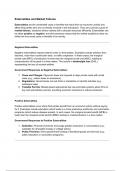Class notes
Class notes ECON
- Course
- ECON
- Institution
- Cornell University
These notes serve as study aids, summarizing lectures, textbook readings, and applied examples. They are divided into two main branches: microeconomics and macroeconomics, though they often include topics from international economics, behavioral economics, and economic policy.
[Show more]



